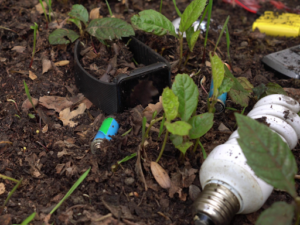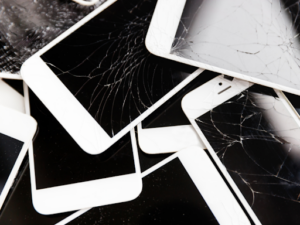If you’re like most people today, you likely spend most of your day using electronics. From your cell phone and computer to your TV and even your car, electronics have become so common in our lives that you might not even notice how many devices you interact with regularly.
While most of us are very comfortable using technology, we might not fully understand what our devices contain or the implications of their components. As consumers, we aren’t expected to understand precisely how these devices work, but we must educate ourselves on using them safely.
You may already know you should recycle your old electronics, but do you know why? Disposing of electronics like regular garbage is extremely harmful to our environment, yet it continues to happen every day. Most often, improper e-waste disposal comes down to a lack of education. At Newtech Recycling, we are committed to protecting the environment through our E-waste recycling and ITAD services and providing information to consumers and businesses alike.
Interested in learning more about why you should never throw old electronics in a landfill? Here are five environmental effects of e-waste that you might not realize.
1. Contaminated Soil from Leeched Toxins
One of the most obvious ways e-waste affects the environment is through soil. Contaminated soil is a huge concern, as it can easily spread after the initial exposure.
Thomas Woznicki, president of Combined Resources, Inc., explains, “One thing many people don’t realize is that e-waste when not properly recycled, can have harmful effects on animals and wildlife. When toxins from improperly processed e-waste leach into soil, they can contaminate groundwater, which can cause neurological damage to animals who drink that water. Aquatic wildlife can also suffer from toxic waste as a result of improper e-waste disposal.”
By contaminating the soil with dangerous chemicals, we risk poisoning everything around it. This contamination often extends beyond immediate areas, affecting agricultural lands and potentially entering the human food chain. The long-term effects of soil contamination can lead to biodiversity loss and disrupted ecosystems, highlighting the need for responsible e-waste management.
2. E-Waste Can Cause Water Pollution
After it’s contaminated the soil, toxins can eventually enter nearby water sources.
Marine biologist and chief editor at Water-Pollution Casper Ohm highlights this issue: “The issue with electronics is that they contain toxic metals such as lead, cadmium, and mercury, all of which are bad for the environment. The way they end up in the water supply is through a process called bioleaching, where the metals gradually leach out of where they were disposed, leaking into neighboring environments. When organisms consume this metal, it’s stored in trace amounts, accumulating over time, and then passed up the food chain.”
The bioaccumulation of these toxic metals in aquatic organisms poses a significant threat to marine life and humans who rely on these organisms for food. The consequences of such contamination include a variety of health issues, ranging from kidney damage to impaired neurological development, particularly in children. The challenge lies in preventing these pollutants from entering water bodies, requiring stringent e-waste disposal and recycling measures.
3. Burning Electronics Causes Damage to the Atmosphere
While contaminating water and soil is a huge concern regarding e-waste, toxins can also be released into the air. E-waste is harmful enough on its own, but when electronics are disposed of incorrectly, they often end up burned, making them more dangerous.
Burning old electronics exposes everyone in the area to the toxins in the air, but it quickly and easily spreads far beyond that. When these toxins are released into the air, they can travel miles. This can lead to multiple people being forced to breathe in contaminated air, leading to further problems, such as respiratory concerns.
Furthermore, the incineration of electronics releases greenhouse gases and contributes to air pollution, exacerbating climate change. These gases include carbon dioxide, a major contributor to the greenhouse effect, and other harmful compounds like dioxins, which are known carcinogens. The impact of these emissions is global, affecting climate patterns and air quality far from the original source.
4. Throwing Out E-Waste Puts a Drain on Resources
Electronic devices are so commonplace that we often don’t realize how valuable they are. Many of the electronics you use daily contain precious metals, of which there is a limited supply worldwide.
When electronics are tossed away and not recycled, these valuable resources are completely wasted when they could have been reused. To create new products, we then need to find these materials, which won’t always be available to us, since they are finite resources. Mining these materials often puts workers at risk as well, making it even more important to recycle existing electronics.
Josh Prigge, owner of the sustainability consulting firm Sustridge, explains some of the concerns of e-waste: “We’re not only talking about the economic value that could be recovered and the new minerals and precious metals that wouldn’t need to be extracted from Earth if we reused what already exists, but what about all the energy and water used to create the once glorious iPhones and laptops in the first place? Most electronic products like the iPhone are in use for a short 12 -18 months before being discarded and upgraded to the newest model.”
By responsibly repurposing components from old devices, we significantly reduce the need for new resource extraction and processing. This recycling process not only conserves scarce materials but also cuts down on manufacturing costs. Emphasizing recycling over production can play a pivotal role in resource conservation, making the electronics industry more sustainable.
5. Improper Disposal Causes Health Issues in Humans and Wildlife
Of course, when so much of our environment has been negatively affected by e-waste, it will eventually start to affect us. While we may not physically live close to where our e-waste goes, it can eventually catch up with us.
Once these toxins are in our food and water, exposure can lead to health issues for humans and animals. While this can affect all of us via water and the foods we eat, those living in underdeveloped areas that take on the world’s e-waste are especially at risk.
Regarding this issue, Casper Ohm comments, “Humans are at the top of this food chain, which is why the toxic metals from e-waste start as a simple battery leak on a crushed iPhone, to the grilled fish on your plate many years later. As the metals spread through the water supply, they will end up inside fish and also in your local produce. Vegetables soak up everything from the water they are given, so trace amounts of metals can be found on them as well.”
The health implications of such exposure are far-reaching, including increased risks of cancer, neurological disorders, and reproductive issues. Children, in particular, are highly susceptible to the harmful effects of these toxins as their bodies are still developing. The importance of safe and proper disposal of e-waste cannot be overstated to protect our natural environment and safeguard the health of current and future generations.
Choose Sustainable E-Waste Solutions with Newtech Recycling
We can dramatically reduce the effect of e-waste on our environment by recycling and repurposing our old electronics. That’s where Newtech Recycling comes in. As a leader in sustainable e-waste solutions, Newtech Recycling offers a practical and environmentally friendly way to manage electronic waste.
Together, we can help to alleviate the strain on our planet’s resources and protect our environment for future generations. Remember, every device recycled is a step towards a cleaner, healthier world. Contact Newtech Recycling today and take a stand against the harmful impacts of e-waste. Your choices today will shape the world of tomorrow.



